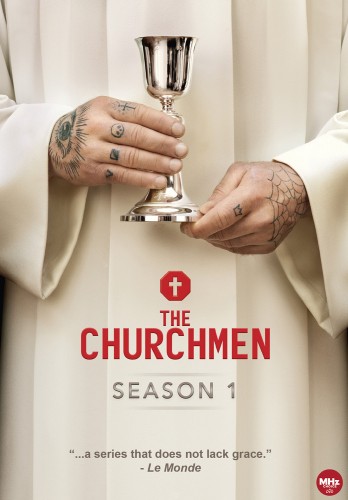The Churchmen — Season 1, Episode 1 Recap
I am a firm believer in Neil Postman’s assertion that religion doesn’t play well on television…particularly when it comes to American television.
But sometimes the rest of the world does a bit better with religion in film, so when I noticed that MHz Networks had the first season (six episodes) of the French-language series The Churchmen available on DVD, I jumped at the opportunity to screen it. The series chronicles five candidates as they arrive at Paris’s Capuchin Seminary.
Despite being a tad overcrowded and a bit formulaic, the opening episode shows promise. The pilot episode has to introduce each of the five students and try to distinguish them in an hour’s time. It’s no surprise under such circumstances that we get a little more exposition than development, a little more telling rather than showing.
Yann is sent off to school by a group of singing scouts and a father who reminds him that a “walk in the woods is better than any therapy.” He quotes El Cid rather than the Bible and gets a little more easily ruffled when things at the seminary don’t match his idealized conception of the monastic life. Guillaume seems to want to escape his domestic situation; his mom brings home a one-night stand in the opener and there are implications that she has prostituted herself. Guillaume is trying to cook breakfast, and one gets the feeling that he is one of those sensitive types drawn to religion in the hopes that God might be an easier parent to appease (or control) than any earthly one.
Most of the pilot episode focuses on José, a parolee from a detention center who has been convicted of murder. In the opening half of the episode we find out that the seminary is short of applicants because one previously accepted seminarian went elsewhere at the last minute. In the second half we find that José’s other applications were all rejected (presumably because of his record) and that his adviser didn’t even bother to send in his application to Capuchin. We also find out that Father Fromenger, leader of the Capuchins feels as though the church is becoming too safe, too institutional, and that those seeking the priesthood are lacking a certain…energy. Does this sound like a match made in providential heaven?
The rest of the episode sets up a conflict between Fromenger and his superior, an ambitious bishop who offers money to fix the Capuchins’ leaking roof only if Fromenger agrees to put off a day of prayer that conflicts with another event the bishop wants to attend. Fromenger disagrees, of course, setting him up as one of those priests who is either a paragon of virtue or so heavenly minded that he is no earthly good.
 None of this is particularly innovative, but the series a nice job of not assuming the audience is composed of cultural imbeciles who need to have everything spelled out for them. The pilot episode also does a nice job of using the priests’ or seminarians’ use of scripture to frame the themes without simply reducing the action to sermon illustrations. Fromenger greets the new seminarians with a sermon from Luke about those who want to follow Jesus but ask first to attend to some other business or obligation. When Fromenger initially gives José the brush off, the latter couches his argument in the parable of the lost sheep. “You never go rescue the lost sheep, you’d rather leave us to the wolves.” Is José aware that he has (subconsciously) labelled himself a “lost sheep” in need of “rescue”? It is interesting to see such an exchange not reduced to a “yes I can” and “I won’t let you down” assertion of self-determination.
None of this is particularly innovative, but the series a nice job of not assuming the audience is composed of cultural imbeciles who need to have everything spelled out for them. The pilot episode also does a nice job of using the priests’ or seminarians’ use of scripture to frame the themes without simply reducing the action to sermon illustrations. Fromenger greets the new seminarians with a sermon from Luke about those who want to follow Jesus but ask first to attend to some other business or obligation. When Fromenger initially gives José the brush off, the latter couches his argument in the parable of the lost sheep. “You never go rescue the lost sheep, you’d rather leave us to the wolves.” Is José aware that he has (subconsciously) labelled himself a “lost sheep” in need of “rescue”? It is interesting to see such an exchange not reduced to a “yes I can” and “I won’t let you down” assertion of self-determination.
Visually, the show seems dim at times — Americans used to the high-key lighting of most network shows may unconsciously think the show is trying to be psychologically darker than it is. And I could do with a moratorium on films or shows that use the crucifix sweating or crying (because of rain or condensation) or crashing or breaking as some sort of easy, symbolic shorthand.
Reading back, it sounds like I am more down on the show than I am. Again, pilots need to be more on the nose than all other episodes. It will be important to see if, having established these character stereotypes, the show gives them some nuance. But I liked the characters in spite of–perhaps because of–their faults. Also, while I think television and film has a hard time with religious characters, both are usually better at developing conflicts within these communities rather than depicting conflicts between them and the secular world.
Evan Cogswell (of Catholic Cinephile) and I will be looking at the rest of the episodes in Season One in the coming month. To find out how to buy The Churchmen on DVD or stream episodes of international television, check out MHz Networks.

